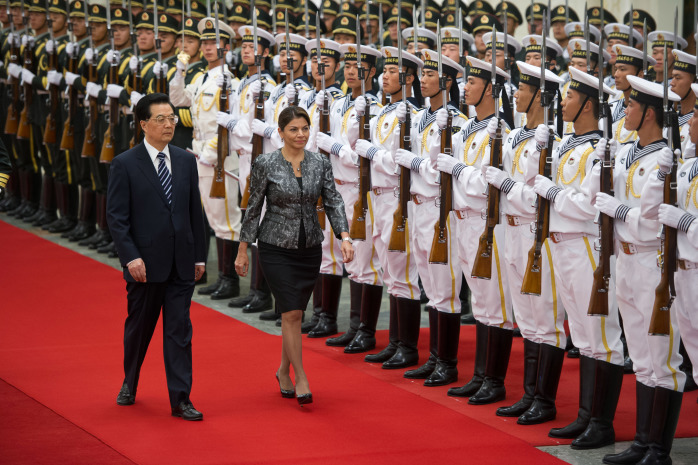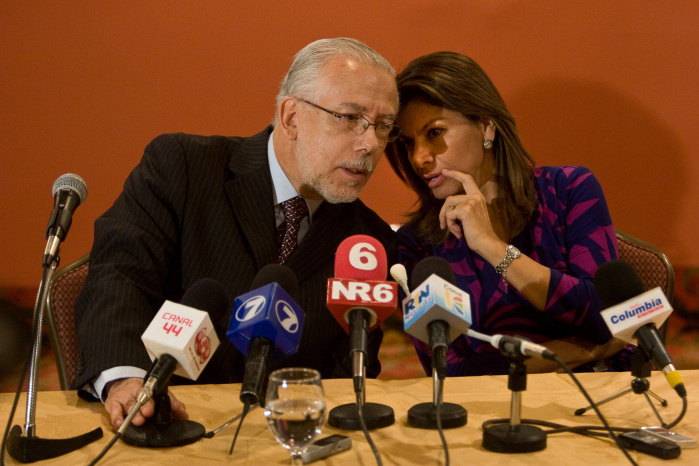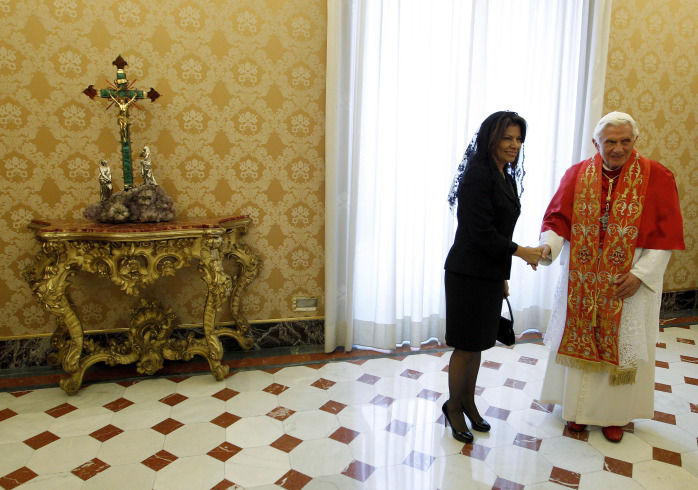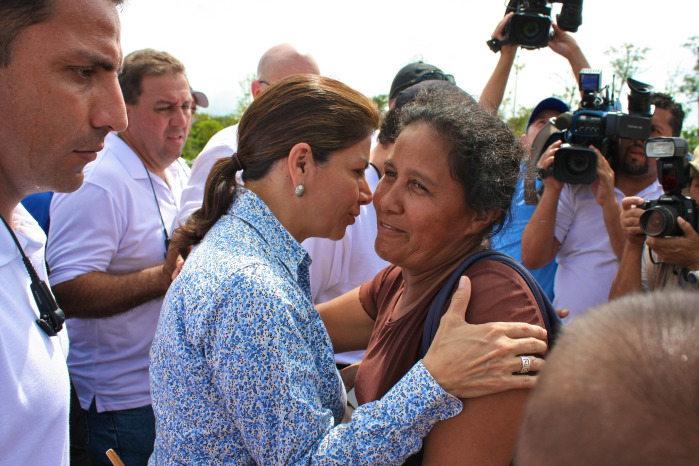In a final presidential State of the Nation speech delivered Thursday night to Costa Rica’s new lawmakers, President Laura Chinchilla cited the global economic crisis of 2007-2008, hostile incursions by Nicaragua, and a sensationalist press as the top external causes of crisis during her administration, which began in 2010.
Chinchilla, 55, of the National Liberation Party, leaves office next Thursday, May 8, and will be replaced by opposition party President-elect Luis Guillermo Solís, of the Citizen Action Party.
In the televised speech, which lasted just under three hours, Chinchilla congratulated the 57 incoming lawmakers, observing that, “You will be confronted with the reality that you will occupy the most politically diverse and fragmented Congress since the inauguration of the Second Republic.”
A perfect storm?
Almost immediately Chinchilla – who finishes her term as the least popular president in the Americas – set a somber tone, admitting that, “It fell upon our administration to act in times marked by dark clouds, which constantly tested our spirit and our capacity to fight for the causes that we felt we should undertake and defend.”
She attributed setbacks to “external and fortuitous circumstances that made advancement more difficult.”
“I’m specifically referring to the critical international economic situation, natural disasters caused by climate change and the hostile attitude of the government of Nicaragua,” she said.
Costa Rica and Nicaragua have pending cases before the International Court of Justice at The Hague over border disputes that started in 2010, and analysts have frequently noted that leaders of both countries have benefited politically from the ongoing row.
Chinchilla also said her administration faced “the worst financial crisis” since “the Great Depression in the 1930s,” with “exports falling by 9 percent, foreign direct investment by 40 percent and tourism by 10 percent.”
The president added that the crisis had destabilized the Costa Rican colón.
However, a Tico Times story from June 2012, titled, “For exchange rate, 5 years of stability,” noted that, “A major achievement of the Costa Rican economy is that the colón-dollar exchange rate – which has hovered around ₡500 to the dollar since 2007 – is no longer a source of anxiety for Ticos or companies.”
The other biggest challenges Chinchilla said her administration faced in the past four years were natural disasters caused by climate change and an earthquake, which she said cost taxpayers ₡200 billion ($367 million), or 1 percent of the country’s gross domestic product.
“Today, the collapse of roads, such as what happened to the Inter-American Highway North, the General Cañas Highway and the Circunvalación [a belt route around the capital], and many more, are only memories of very uncomfortable moments for our people,” Chinchilla said.
She then returned to the theme of “aggression” by Nicaragua, calling the country an “expansionist” threat to Costa Rica’s sovereignty.
According to political analyst Gerardo Hernández, the first section of Chinchilla’s speech is rhetoric designed to “shift public attention to factors that alleviate the administration from its responsibilities.”
“It is a mechanism to distract from an effective accountability, and what it shows is that this government has been more reactive than proactive,” Hernández told The Tico Times.
Political scientist Gina Sibaja noted that by focusing on external distractions, Chinchilla failed to mention the country’s internal difficulties, and the unfavorable conditions that existed when her predecessor, Óscar Arias, also of the PLN, left office in 2010.
‘Our legacy: A more secure Costa Rica’
President Chinchilla claimed to leave a country more economically balanced than it was when she took office.
“At the end of my term, we have left a stable economy that managed to recover past growth levels and is trending toward more job growth,” she said, adding that Costa Rica has the “lowest [inflation] in the past four decades.”
Growth during her four years in office averaged 4.5 percent, she said.
Trade liberalization was a key goal of her presidency, and accomplishments in this area include free trade agreements with the EU, China, Peru and Colombia. Under Foreign Trade Minister Anabel González, the country moved closer to joining the Pacific Alliance, a Latin American trade bloc whose founding members, Chile, Colombia, Mexico and Peru, have expressed interest in allowing Costa Rica to join.
Chinchilla acknowledged that “trade liberalization alone does not guarantee development,” but that, “evidence shows it is an important engine for growth.”
For Sibaja, the president left out the most important factor in productive growth: workers.
“At no time did she mention the workers, who are the ones who contribute to the productive sector. She didn’t mention citizens. What happened to the labor guarantees and the deterioration of working conditions?” Sibaja asked.

Accomplishments on infrastructure
It is no secret that Costa Rica’s infrastructure and the processes for public-private concessions are among the greatest limitations to the country’s development in the 21st century. Yet Chinchilla claimed Thursday night to have made significant advances on infrastructure, a statement that is sure to raise eyebrows.
For example, in April 2013, Chinchilla was forced by massive protests to appear on national television and announce the cancellation of a $524 million San Ramón highway modernization contract granted to the Brazilian company OAS. The project was strongly promoted by her public works and transport minister, Pedro Castro, a former OAS consultant.
Castro had recently replaced Chinchilla’s former transport minister, Francisco Jiménez, who departed the administration in 2012 over another scandal involving $40 million in allegedly stolen funds from an emergency road to be built along Costa Rica’s northern border with Nicaragua (an issue the president addressed near the end of her speech).
Barely 15 months into her term, five ministers and four vice ministers already had resigned or been forced out, and by June 2013, Chinchilla had lost almost a third of her original Cabinet members. Many of the infrastructure projects she mentioned on Thursday, such as a major port expansion on Costa Rica’s Caribbean coast, and the renovation of both Route 32 to Limón and the San Ramón Highway, are a long way from completion.
Social spending
“One of the first decisions we made was to protect social spending,” Chinchilla remarked, saying that social spending during her administration totaled 23 percent of GDP, “one of the highest rates the country has ever had.”
She also mentioned her proudest program, the Red de Cuido, a care services network for children and seniors.
Montserrat Sagot, a University of Costa Rica sociologist, questioned the effectiveness of that program.
“What it did was cover 29,000 kids, but in reality we have more than 800,000 working women in this country who also need help,” Sagot told The Tico Times.
Education and health spending reached “historic levels,” the president added, at 7.2 percent and 6.8 percent, respectively. “Thanks to this investment, … poverty did not increase during this period.”
But according to Costa Rica’s 19th State of the Nation report (prepared by academics and experts), published at the end of 2013, the growing high-productivity, export-driven sectors of the economy have concentrated the country’s economic success in a few elite groups, both socially and territorially, contributing to a widening inequality gap.
The report noted with concern that Costa Rica was the only country out of several Latin American countries whose GINI coefficient increased between 2001 and 2011.
The Tico Times reported at the time that, “Costa Rica is entering a period of high-income inequality after reporting a 0.518 GINI coefficient, a measure of national income distribution, in 2012 – the highest since 1987. The top 10 percent of Costa Ricans make 24.8 times as much as the poorest 10 percent.”
The story adds that, “Only 46.3 percent of Ticos between 17 and 21 have completed high school, according to the 4th State of Education report, … preventing them from applying to many of the best-paid jobs.”
Yet Chinchilla contradicted the report, saying, “In education, we have managed to reduce the drop-out rate, significantly increase educational coverage, and drastically reduce the gap between urban and rural education, or between levels of income.”
A Social Security System in crisis
The president acknowledged that an analysis of social gains would be incomplete without addressing the dire fiscal situation at Costa Rica’s Social Security System, or Caja. In 2011, the Pan America Health Organization warned that without intervention, the Caja would soon be bankrupt, jeopardizing the country’s public health care services.
“The responses to the financial crisis [at the Caja] were on three levels: complying with the state’s financial obligations, rigor in front of companies in debt [to the Caja], and the adoption of drastic measures to adjust the institution’s spending. On all of these levels, we have had positive results,” Chinchilla said.
Environmental gains
The focus of Chinchilla’s environmental platform was in five areas: territorial legislation, better water management, protection of oceans and rivers, and carbon neutrality and renewable energy.
“Compliance with our proposed goals in these areas can be seen,” Chinchilla said.
Those achievements included developing 13 zoning plans and reaching 81 percent of the country’s now-scrapped goal of becoming entirely carbon-neutral by 2021, according to the president.
“We declared a new protected marine area adjacent to Isla del Coco, which tripled the percentage of protected marine areas,” she said. “Regulations for tuna fishing were passed. An important battle against shark finning was launched, and the country’s first National Oceans Strategy was designed.”

A safer Costa Rica
When candidate Chinchilla won the presidency in 2010, she had campaigned strongly on improving public security, which she called “our greatest commitment to Costa Rica.”
The country “had reached epidemic levels of violence, with homicide rates at 11 per 100,000 citizens,” she said. “Anguish and anger were growing. … Costa Rica is a safer place today.”
She cited decreases from 2010-2013 in auto theft, home invasions, and armed robbery of businesses. And she noted that the homicide rate had dropped to 8 per 100,000 in 2010 and 2011.
“We provided better training, equipment and working conditions for police. We sought a more effective police presence. … And we achieved more effective collaboration between the police, prosecutors and judges, which diminished impunity,” Chinchilla said. “Today, almost 90 percent of the cases that are passed from the police to criminal flagrance courts receive convictions.”
Calling organized crime “one of the greatest threats,” Chinchilla said officials had targeted organized criminals “like never before,” including the infamous Liberty Reserve case, which the president called “the biggest electronic money laundering operation in history.”
She did not mention the company had operated openly in Costa Rica for seven years before it was dismantled by a global, U.S.-led law enforcement operation, with eventual cooperation by Costa Rican agencies.
Nor did she apologize for perhaps the biggest scandal of her administration, traveling twice to South America on a private jet allegedly linked to drug traffickers.

A matter of ‘perception’
Chinchilla said her “aspirations” of four years ago are now “achievements that positively affected the country,” in spite of the “dark clouds that overshadowed the perception of the country’s situation. …
“Costa Rica is No. 1 in liberty, peace and democracy in Latin America, and one of the best in the world,” she said. “Costa Rica is No. 1 in social progress, happiness and well being in Latin America. … Costa Rica is No. 1 in human capital and innovation in Latin America. …”
“So the country is doing well because we appear to be doing well on a few international indicators, because we’re better than some other countries?” countered Hernández. “This entirely evades internal responsibility.”
And what about human rights? Sagot asked. Costa Rica still hasn’t implemented a 2012 ruling by the San José-based Inter-American Court of Human Rights ordering the country to legalize in vitro fertilization. Costa Rica still is the only country in the Western Hemisphere to outlaw the fertility procedure.
Other issues, such as LGBT rights and same-sex civil unions, also failed to advance.
“That’s because Laura Chinchilla negotiated with fundamentalist religious groups. She continued to negotiate, and she kept those promises, never looking back,” Sagot said.
At the tail end of her speech, the president finally mentioned her administration’s shortcomings, citing a failure to adopt fiscal reform and institutional reform. But instead of introspection, the president blamed tax evaders and “individuals and groups who impede the important political advances our country requires.”
On the failure of her administration’s keystone policy proposal, fiscal reform, Chinchilla blamed the Constitutional Chamber of the Supreme Court, or Sala IV, without mentioning the resignation of her former finance minister, who was accused of being one of the tax evaders while at the same time calling for tax hikes for the rest of Costa Ricans.
For institutional reform failure, she blamed lawmakers.
And for one of the biggest scandals of her administration – the infamous Ruta 1856 along Nicaragua’s border – she blamed the press.
“The road was conceived as a necessary and urgent response to the offensive invasion of our territory by the Nicaraguan Army. The project encountered problems, and I denounced them; but the coverage in the media of those problems was full of sensationalism and inaccuracies, and it induced mistaken conclusions,” Chinchilla said.
She called the border road a “bold and visionary project” that would permit Costa Rica to “exercise its sovereignty” and foster development in rural, poor communities that desperately need it.

“A victim of the media,” Sibaja said. “She alludes to the fact that the news media treated her badly, they defamed her, they lied. But it seems to me that if that’s the case, then why didn’t anyone denounce it at the time?”
In another odd leap, Chinchilla claimed her failures were extensive because she and members of her administration were overly ambitious.
“It’s possible that we would have encountered less risk if we had aspired to achieve less,” Chinchilla said. “Fear of failure is the condemnation of a weak spirit to stagnation and mediocrity.”
Then she went after the press again.
“We all know very well that good news often is discounted and doesn’t receive the attention it deserves, and that the priority of the news media is to promote tragedies, scandals and controversy. We all know that,” she said.
“Today, when I end my term, I issue an emphatic call to news outlets and their professionals to practice creative professionalism, based on facts, driven by reason, guided by integrity and centered on the country’s well being,” she said.
Chinchilla ended her speech by asking “God and the Virgin of Los Angeles to always bless Costa Rica.”






